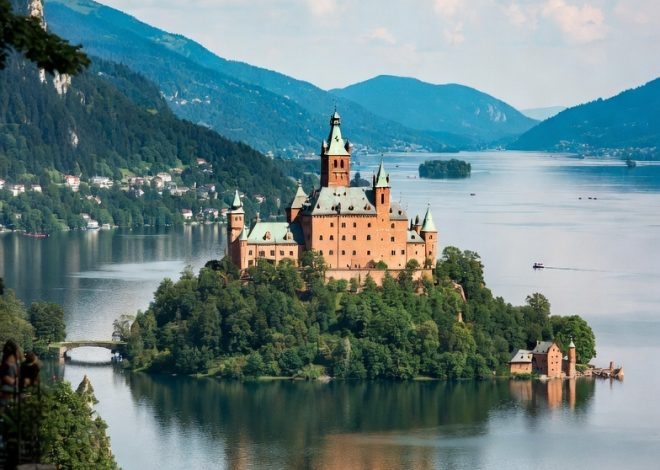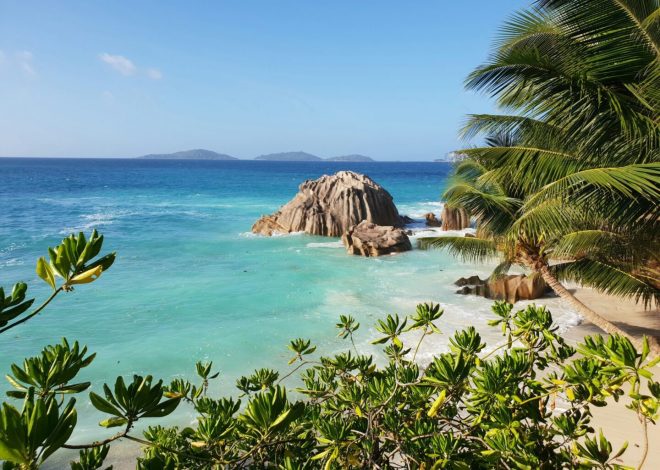
A Comprehensive Guide To Venice
Arriving in Venice, you feel like you have been taken back in time. You’re greeted by glorious Venetian architecture, passages that burst out into beautiful piazzas, priceless marble buildings, and a lagoon that spread out between buildings immersing them into water, beautifully carved gondolas that transport you through the waterways of the city. There is simply nothing quite like it – almost like a glimpse of heaven – on earth.
If the ambience and architecture of the gorgeous city aren’t enough to make you want to book a flight to Venice, maybe the dining scene will have you searching flights right away or have the ultimate break with a tailor-made experience. The array of restaurants on offer is second to none, with all the locals seating no more than 30 people at a time, and are hidden alongside the canals of Venice, or within small piazzas within the city. You can find the likes of seafood, pasta, pizza, and so much more. If you dream about it, you can find it.
It is a city where you need to be in the know, so doing your research is important as it not a “wander and find” destination, as often enough the best restaurants are spread across the islands and you could be walking for some time. My only tip to you all, don’t miss out on indulging in a pre-dinner aperitivo, toasting with Veneto’s signature bubbly, prosecco. The Venetians take aperitivo hour very seriously, serving up lavish spreads of cicheti, but still, save room for a proper sit-down meal.
I’m sure you are thinking about when and where to go, where’s the best place to stay, and what to do in Venice? Well, let’s get stuck in.
When to visit Venice
The best times to visit for great weather is from April right through to July, but with the idyllic climate and the children’s school holidays comes with a flurry of tourists. When I visited, I went towards the end of the busy season in August. The temperatures were slightly hot (highs of 29 degrees), but you need a jumper or cardigan by night, as it does get a bit chilly. However, it made for the perfect trip, as there weren’t as many tourists, plus hotel and flight prices were more reasonable.
Getting into Venice & around the city
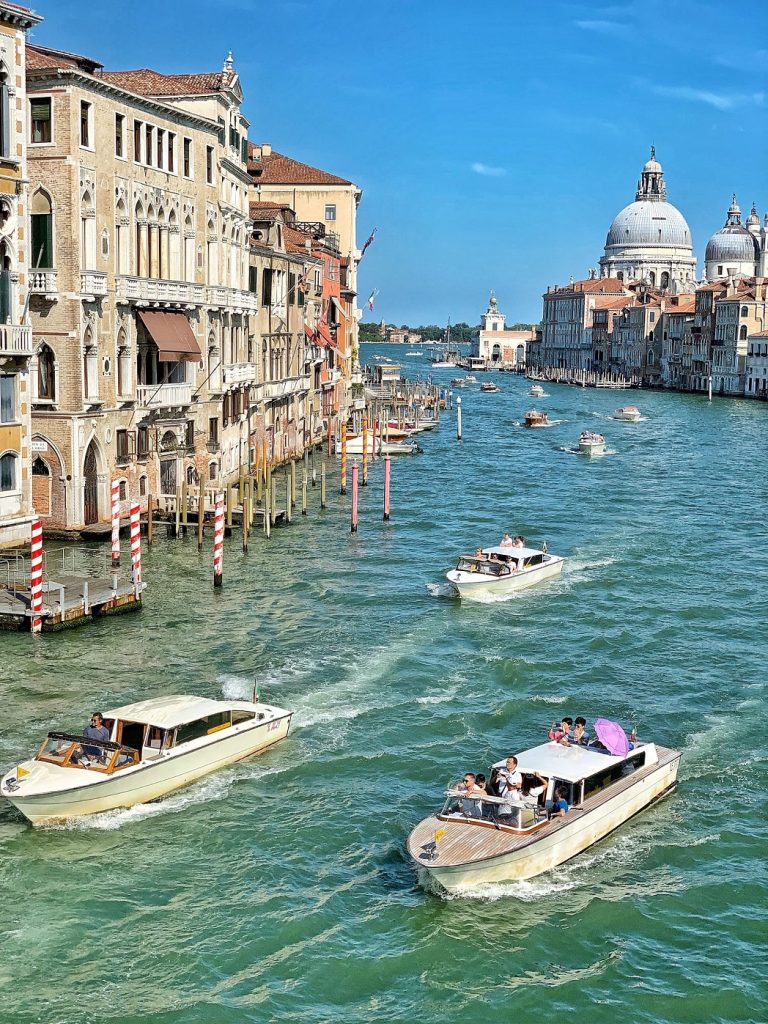
The biggest mistake people make is booking the water taxi and paying extortionate fees to get into the city. The first thing you need to know, the delightful place we know Venice to be is the centre of the city, but beyond the small archipelago of islands resides the a wider traditional city-like part. In a way, you can compare it to London. Central London is busy, very few people drive, and it’s full of tourists, but as soon as you leave central London, everyone drives, there are fewer tourists, and its increasingly residential. Therefore, you can access the outskirts of islands by coach, which only takes 20 minutes from Marco Polo airport and costs only eight euros each way, compared to the 120-150 euro charge incurred by water taxis.
Once you reach the outskirts, you can buy tickets for the water bus for the duration of your stay and directly access the boats and, you will be well on your way to your hotel. I paid 40 euros for three days, but otherwise, it is 20 euros for one day, 30 euros for 48 hours, or 60 euros for seven days. The water bus is the most convenient way of getting around the city, with it running from 5 am right through to midnight. When you’re on the island, most of it the touristy sites are within walkable distance, which makes it an even more enjoyable place to visit during the warmer months.
Where to stay
In most cities, I would stick to certain luxury hotel brands or research into some of the finest boutique hotels. Venice has plenty of quintessential Italian hotels ranging from 12 rooms right through to a hundred. While your big names still dominate the city, you may find luxe comfort in quieter areas of the city. On my visit, I stayed at Hotel San Lorenzo, which was a beautiful hotel with 16 rooms. It was situated in a central yet peaceful part of the city, right next to the canals, and a few alfresco restaurants in a romantic setting. You can access the hotel with within a five-minute walk from San Zaccaria water bus stop. It’s also a short seven-minute walk to the central hub of the city, San Marco.
Six must-do things in Venice
- Visit St. Mark’s (San Marco) Square & Basilica
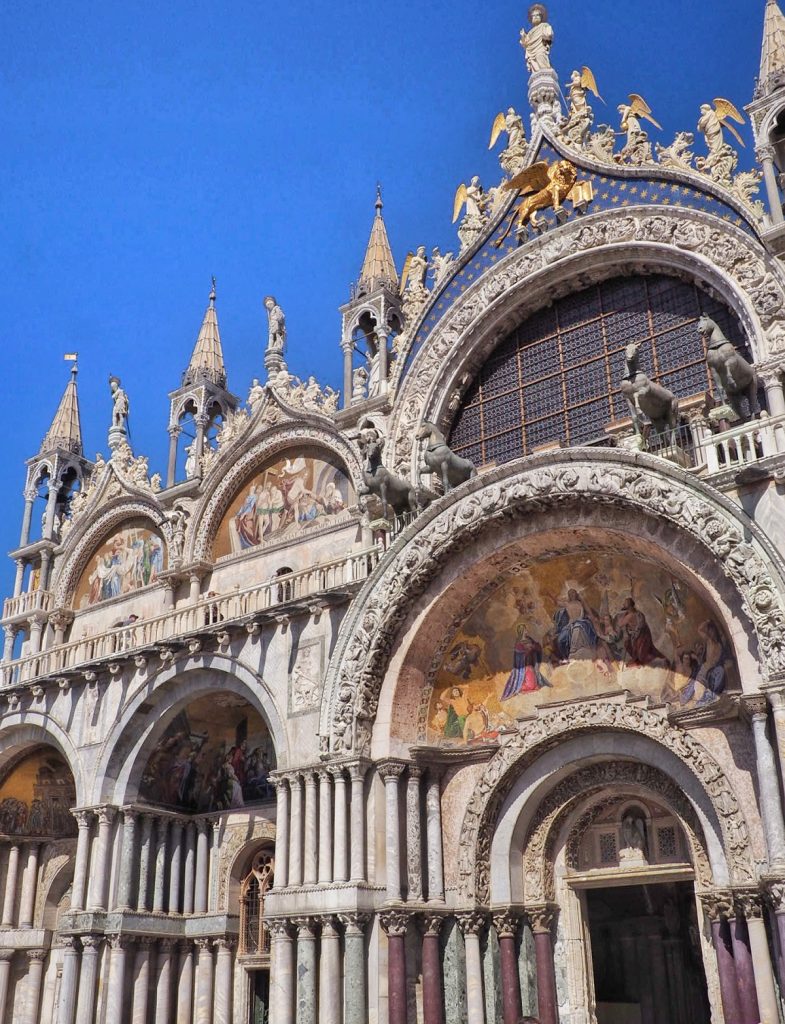
It’s a prominent spot for tourists, not only for it being the broadest swath of flat, open land in a water-bound city, but it’s a popular meeting spot for locals too. Often known as the “drawing room of Europe” and home to the stunning San Marco Basilica, which brings many people to the square initially.
San Marco’s Basilica is some of the most intricately designed cathedrals in the world, which makes it Venice’s most fascinating attraction. The architecture encompasses many different cultural elements, with Islamic and European influences. The 85,000 square feet of golden mosaics, 500 romanesque columns and museum contains an array of intricate pieces from the past.
- Take a trip on a gondola
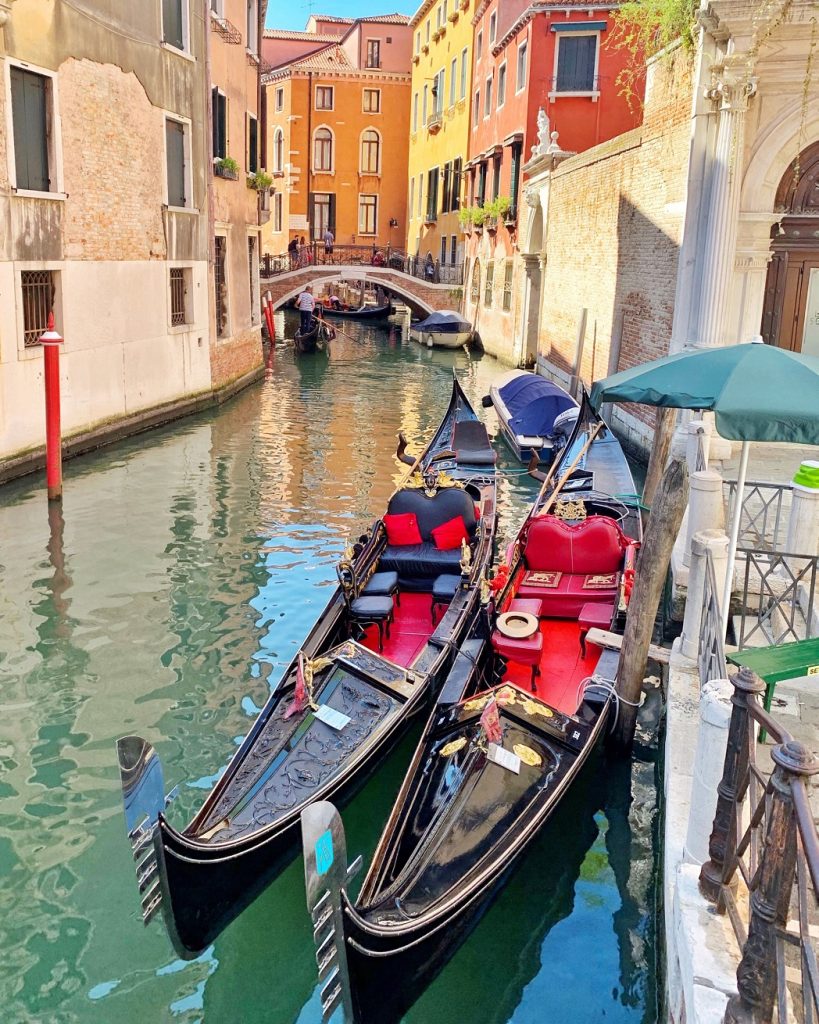
Riding a gondola down the canals of Venice is a bucket-list experience for many and a very romantic thing to do too. However, if you are looking to jump aboard the banana-shaped boat, you should know a few details. Often enough the gondola tours last around 30-35 minutes and can cost between 80 euros and 120 euros depending on what time of day you wish to enjoy the experience. Should you want to stay longer, you can extend your ride for a further 40 euros for every additional 20 minutes abroad. If you want a pleasant experience, I would recommend taking a gondola from a quiet canal, rather than the Grand Canal, or you might find yourself stuck in a gondola queue.
- Visit Doge’s Palace (Palazzo Ducale)
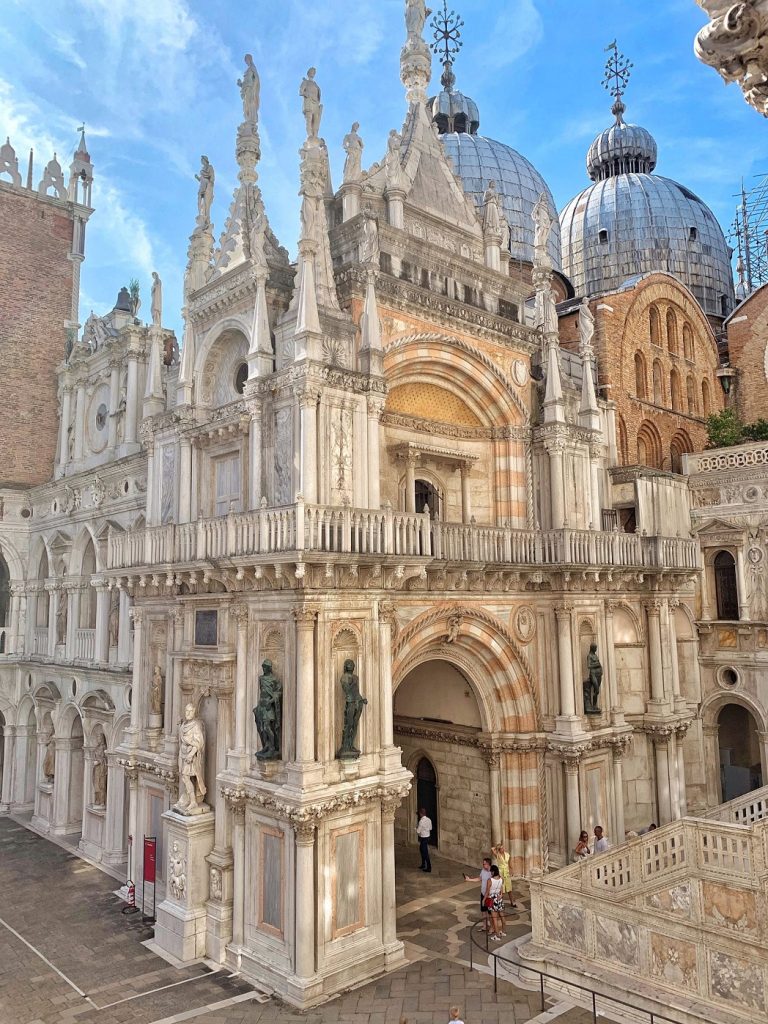
A visit to Palazzo Ducale is a must, especially if you can appreciate a majestic architecture, beautiful interiors and the opportunity to see the Bridge of Sighs from afar. The palace itself was initially a gloomy wooden fortress transformed into the glorious gothic-style palace it is today. What makes Palazzo Ducale unique is all the paintings inside were added to decorate the palace when it was in use, and not added when it turned into a museum, like most other museums. It is a monument you have to visit to experience its beauty, there aren’t enough adjectives to describe it.
- Take a trip to Murano and Burano
A lot of people miss out on the opportunity to visit Murano and Burano when they visit Venice. I’m here to tell you to move it to the top of your list because each of the minuscule islands offer a different perspective. Best of all, the water bus tickets I mentioned above covers the journey to both islands. You can take a water bus from San Zaccaria, which stops at Murano first and then goes all the way to Burano, taking a total of 45 minutes. However, I suggest leaving early in the morning and going directly to Burano first, checking out the vibrant coloured fishermen houses, before jumping aboard again and stopping off at Murano, which is known for its Venetian glasswork.
You can’t visit Murano without seeing the glass blowing in action, as it’s truly incredible. I suggest going to The Glass Cathedral, where entry and the 30-minute demonstration only costs seven euros, or you can add a glass of prosecco for a few extra euros.
- Check out the Rialto Bridge
The Rialto Bridge remains as an icon to the city, as it is the oldest bridge spanning across one of the narrowest parts of the Grand Canal. But, back in the day, its primary purpose was to provide access to the Rialto area, which became one of the most critical districts as it is where the Rialto Market resides. Nowadays, it makes for the perfect Instagram shot too. Win-win!
- Stop by the San Giorgio Maggiore Church
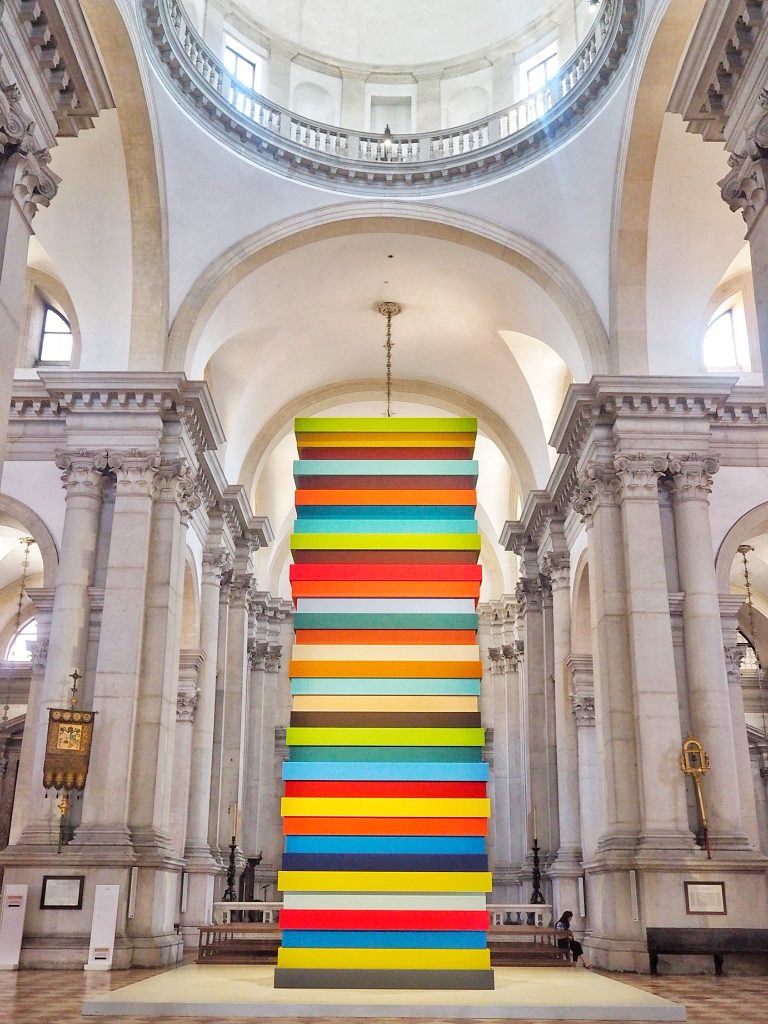
If you have time, pop over to San Giorgio Maggiore island, which is often recognised for its beauty, but it’s also home to the San Giorgio Maggiore Church providing a somewhat different perspective of Venice. Beyond the enchanting facades, the church houses the Fondazione Giorgio Cini, one of the most iconic international institutions. As a part of it’s commitment to the foundation, it currently holds a colourful sculpture of Sean Scully on display, as part of the Art Biennale 2019, which is a must-visit!

